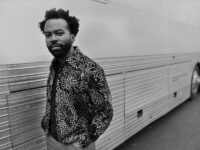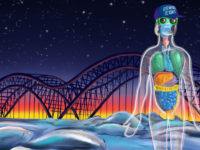feature photo: Charlie Gross
After a five-year lull in release activity from Meshell Ndegeocello, The Omnichord Real Book is a welcome reminder that in this post-Prince/post-pandemic age, there probably isn’t an artist of contemporary music who is simultaneously diversely talented and uncompromising as much as she is.
That prior album Ventriloquism was an all-covers affair, making Omnichord her first album of original material since 2014’s Comet, Come to Me. She never stopped making music as she’s been an in demand for her soundtrack work, but the solitude brought on by lockdown and the passing of her parents brought the itch to make another personal musical statement.
‘Personal musical statement’ is how to accurately describe a typical Meshell Ndegeocello album, coming from an artist who has long followed her own muse, and in doing so brings a greater gratification to those who embrace her music without conditions. She divulges her overall approach in very plain terms: “Be true to yourself in your own voice, and not be understood but felt.”
The Omnichord Real Book got its name because it was composed largely with the help of an Omnichord, a compact electronic instrument that’s been around since the early ’80s capable of imitating percussion, keyboard and string sounds. Often used in a kitsch sense, Ndegeocello exploited its potential as a songwriting vehicle, able to imagine and lay down the basic parts of arrangement for a song as that song is being conceived. The instrument is also used in the final product but Ndegeocello is also savvy enough to make it sound anything but kitschy.
It’s present at the start, on “Georgia Ave.” An homage to a major thoroughfare in Washington, DC along which much of the rich, African-American culture thrives, pulling together an interesting mix of instruments, ranging from acoustic guitar to that Omnichord against a go-go backbeat beat with African percussion and the jazzy saxophone of Josh Johnson. It’s a melting pot of styles, coming together ambivalently, making it strangely more attractive.
The first single from the album, “Virgo” seems to have sprung from a jam but polished so well with otherworldly lyrics of rejuvenation with Brandee Younger’s harp and Julius Rodriguez’s Farfisa organ floating around a nasty, techno groove. Another edit of this song appears at the end of the album, putting Johnson’s overlapping saxes into the mix and pushing it into a jazzier direction thanks to an arrangement by saxophone giant Oliver Lake.
So yes, jazz becomes a major ingredient in Ndegeocello’s brew, but she is able to demonstrate how African music is the connective tissue between this and other African-American invented genres. “Clear Water” gives guitarist Jeff Parker plenty of running room at the intro to show off his warm toned chops. Behind him is a Isaac Hayes vibe and some old-school rapping tossed in by Ndegeocello as she largely cedes the lead vocal role over to Justin Hicks, who gives the song about introversion the sincerity it requires.
An acoustic guitar appears often, alongside some decidedly more technologically advanced instruments as on “Good Good,” a reminder that Ndegeocello is, at heart, a folk singer-songwriter, and with the jazz currents also swirling about, she shares a lot of musical DNA with Joni Mitchell in particular.
The instrumental “Omnipuss” feels like a full Afrobeat band performing it, but it’s just a quartet with Ndegeocello playing the Omnichord very resourcefully alongside her bass. “ASR” is another Afrobeat excursion, this time with Parker’s discerning lead but it’s Ndegeocello’s bass with its perfectly-placed notes that really stands out.
As we heard on her prior release, Ndegeocello is a sensitive interpreter of other people’s songs, and she took full ownership of Samora Pinderhughes’ fragile ballad “Gatsby” just with her voice, assisted by Joan As Police Woman. The glowing, gentle-going “Towers” gets chilled by the vibes of Joel Ross. “Burn Progression,” featuring and also cowritten by trumpet star Ambrose Akinmusire, is dream-like as much as it’s groove-laden, taking a satisfying detour into a freedom before getting back on course.
“The 5th Dimension” sits in the part of the sequence where you usually finding the album starting to sag. Instead, this is one of the more inspired tracks. Intensely kaleidoscopic through celestial sounds and vocal harmonies with the Hawtplates, Abe Rounds (drums) and Johnson interject with jazz breaks at the right moments.
There are 18 tracks stuffed in here, a lot to be sure, but many are brief numbers that showcase a great idea or two and don’t linger after the case is made, a tactic fellow bass boss Thundercat is known for. “An Invitation” and “Call The Tune” are impressionistic and made more so by their brevity. “Perceptions” even boasts a major jazz pianist in Jason Moran.
While this creative burst came with the help of luminaries mostly from the jazz realm, The Omnichord Real Book sounds like the singular musical vision of Meshell Ndegeocello, even on songs she didn’t write or sing. It’s an aura that comes from being both supremely talented and stridently independent.
The Omnichord Real Book, her debut for Blue Note Records, is now available everywhere. I recommend you get it from Bandcamp.




